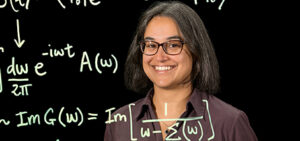Meera Parish is a FLEET Chief Investigator and a full Professor in the Monash University School of Physics and Astronomy. Meera is a theoretical physicist investigating and mathematically describing the behaviour of large groups of interacting quantum particles, such as atoms or electrons that can exhibit exotic behaviour, such as superfluidity where they flow without encountering resistance.
Meera’s experience with bias reflects that of other FLEET women where people express shock or surprise that a woman does physics, let alone being a female physicist that has reached the highest level in academia.
“I certainly think it’s important for us to strive to break the bias, but I also recognise that it’s highly challenging because the bias is so pervasive in our lives and it’s sometimes even difficult to identify. I have encountered it more and more as I progress through my career. For instance, a random person I spoke to outside of work thought I was joking when I mentioned I was a professor.
In a way, I think I am already challenging the bias simply by existing as a female physicist, but I also intend to actively combat it in my workplace, especially now that I am more involved in hiring and promoting people,” she says.
Professor Meera Parish, physicist and Breaking the Bias
Meet Meera Parish.
Find out what it is about physics that drew Meera into the profession, especially the counter-intuitive world of quantum physics, and her hope to see Australia become a research leader in the field of condensed matter and quantum physics.
Meera’s research
Meera’s research in condensed matter physics examines how quantum mechanics come into play in different phases of matter (solids, liquids, gases). For example, one area of her research is to understand the way in which materials change when exposed to light.
Meera also examines the theory of how atoms behave at ultra-cold temperatures, near absolute zero or ̵273˚ Celsius. At this extreme temperature, interactions between atoms can be tuned and controlled.
Elsewhere, Meera’s research has contributed to a theoretical understanding of how to build a quantum battery that can, theoretically, charge faster than a conventional battery.
“In general, my focus is on understanding how things work rather than on their application. It is difficult to predict what physics will lead to technological applications in the future, so I think it’s important to build up our fundamental knowledge of quantum systems,” she says.
Read more about Meera’s research and achievements in The Lens
And in FLEET News.
Check the four other FLEET women profiled for International Women’s Day
Maedehsadat Mousavi; Patjaree Aukarasereenont; Peggy Schoenherr; Golrokh Akhgar


